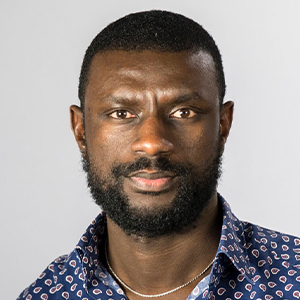By Makmid Kamara , Atlantic Fellow for Social and Economic Equity
We are marking Africa Month this April. Makmid Kamara , an Atlantic Fellow for Social and Economic Equity, supports public-interest media in Africa and the Middle East in a drive to make the countries more economically resilient and work for democracy. The Atlantic Institute with his organization Reform Initiatives recently hosted a community conversation for the Atlantic Fellows and partners examining the importance of preparatory justice.
There will be no equity, if there is no reparatory justice for historical and contemporary crimes against humanity. There will be no equity if Africans and People of African Descent across the world continue to face racial, social, environmental and other forms of injustices. There will be no equity if the systems of oppression and subjugation that hold one race superior, and another inferior, continue to be sustained and strengthened in all but nomenclatures.
This is the argument many of us across the world have been making in our various efforts to advance racial, social and economic equity. It is the foundational principle of the campaign efforts that eventually led to the African Union (AU) declaring 2025 as the Year of Reparations. The AU’s Theme of the Year is justice for Africans & people of African descent through reparations. This declaration is testimony to the continental body’s commitment to advance justice, accountability and repair for historical crimes and harms committed against Africans.
This month, the Atlantic Institute collaborated with my organization, Reform Initiatives, to co-host a three-part series of webinars on the AU’s theme in the lead up to Africa Day in May. The first episode of the webinar series was well received by those who attended. The panellists, carefully chosen to share their individual perspectives from the African Union, the Pan-African feminist movement and the Atlantic Fellowship community, shared insights into work already done and the ongoing efforts to achieve equity through reparatory justice.
The webinar series is the first of many initiatives borne out of the Nairobi Commitment, a list of action points developed by African Fellows during a convening in Kenya in 2024, with support from the African Initiative and hosted by the Atlantic Institute. The series aligns with the Africa Initiative’s plan to elevate African discourses in the continent and engage Fellows and scholars to discuss global issues from a Pan-African lens.
In the first episode, we discussed whether justice for Africans and people of African descent can be achieved through reparations, whether it is a pipedream or a reality. We evaluated the progress made since our similar conversation organized by the Atlantic Institute in May 2023.
In that time, there have been tremendous gains with many major conferences and events held to specifically discuss reparations. It has been a major topic for the African Union, to the Commonwealth Heads of Government Meeting where for the very first time the topic of reparations was in the final communique. Importantly, the increased momentum and the involvement of the African Union has driven the issue of reparations up the global agenda, with grassroots and social movements across the world taking positive steps forward toward the shared goals.
Highlights from the first episode included an explanation from William Carew , Head of Secretariat of the civil society organ of the African Union, about what the AU does and its aim to ensure that Africa becomes a united, peaceful and prosperous continent for all its people within and outside its boundaries. He noted that this year’s theme is an example of the AU responding to the demands of its citizens. Carew assured us that the African Union’s door is open for meaningful partnerships and collaborations geared toward upending systems and structures that create barriers for the achievement of global equity.
One of the panelists, Diakhoumba Gassama, laid out powerfully the necessity of making the reparations campaign transcontinental and intersectional. This cannot be overemphasized. She underlined the importance of the campaign for global equity through reparations being GLOBAL, challenging African civil society, and by extension social justice leaders in the Atlantic Fellowship, to campaign and coalesce for equity beyond geographical or other forms of borders and boundaries.
In the next episode, Atlantic Fellow and activist, Tyehimba Salandy, with join Meghna Abraham and Kudzayi Ngwerume to expand on a conversation about the imperative of interlocking justice, and the intersectionality of reparations and climate justice. A key question is whether there can ever be climate justice without reparations.


.jpeg)



.png)

